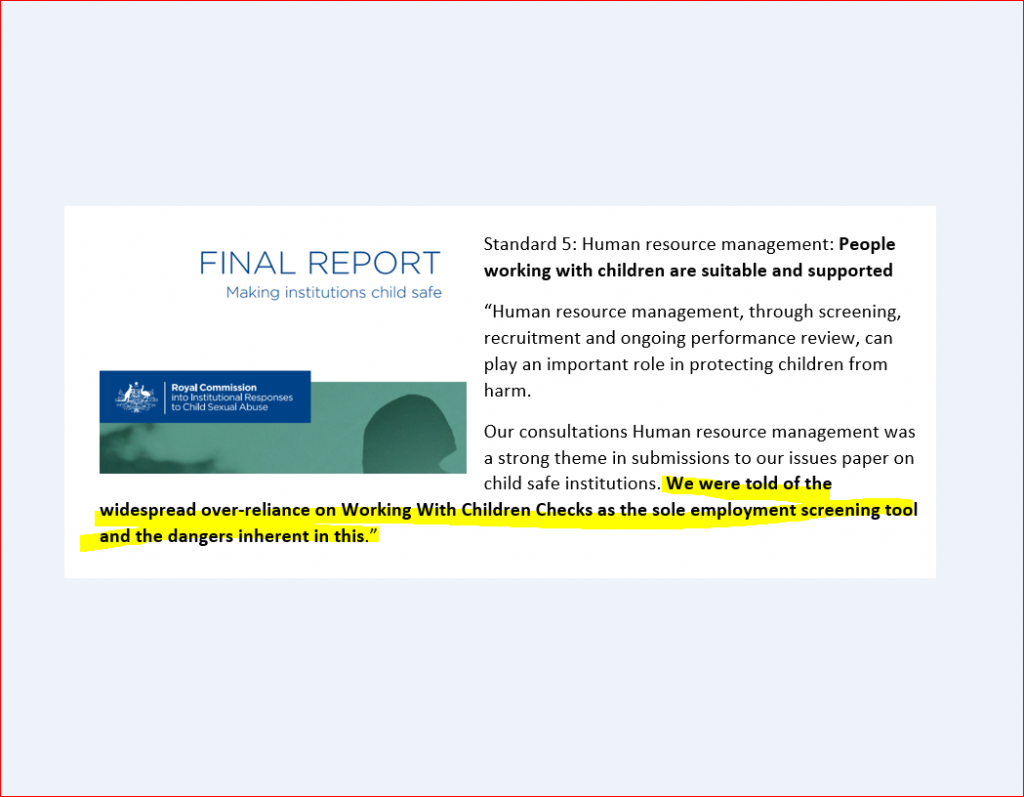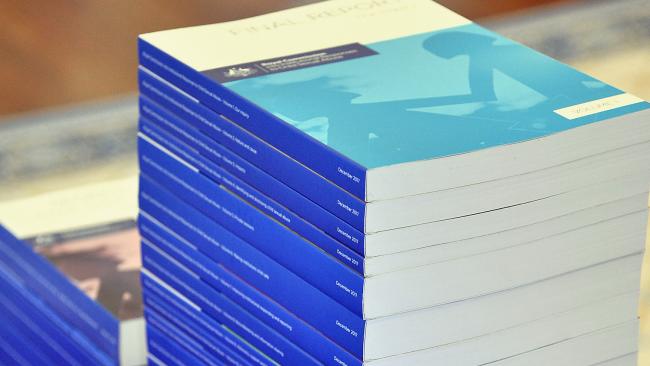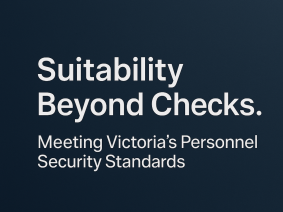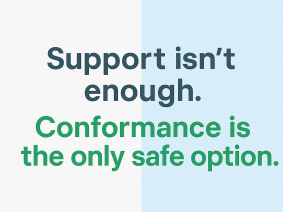A response to the Child Abuse Royal Commission: a way forward to stop the pain of hiring the wrong person.
The Royal Commission’s Final Report relating to human resource management noted that “the nature of religious ministry requires more rigorous screening and selection than for other employees, to ensure that individuals are suitable for their roles.” (emphasis added)
In the final report, Standard 5 mentions that “people working with children are to be suitable and this should be assessed at the point of recruitment, including screening” and “relevant staff and volunteers have Working With Children Checks [WWCC].” (emphasis added)
Cleard.life believes that the WWCC is not a rigorous screening solution, in of itself. It needs to be augmented. WWCC considers only a filtered, handful of convictions which each State body deems to be relevant. That’s why, at present, 1 in 6 current WWCC holders have criminal convictions. Remember the WWCC’s aim is not to assess a person’s overall character and therefore it leaves a lot of gaps and therefore risk on the table for the organisation.

When considering “suitability”, criminal history is just one dimension that should be screened and assessed. The provision of a rigorous character screening ‘suitability clearance’ will give the religious organisation the confidence it needs to know for sure that the person has a suitable character. Imagine being able to also screen a person’s background for mental health issues, hidden alcohol or drug abuse, or personal conduct – including sexual behaviour. A ‘suitability clearance’ that checks, and risk assesses, ten different areas of a person’s life can make an extremely valuable contribution to the recruitment and screening improvements and recommendations handed down by the Royal Commission.
Recommendation 16.4
The Anglican Church of Australia should develop a national approach to the selection and screening of candidates for ordination in the Anglican Church.
The Cleard.life Suitability Clearance can completely and thoroughly check a person’s background for the last ten years – or even their entire life (CL3). The standards used to make assessments are applied to more than 350,000 Public Servants and Contractors as security clearance holders. Think of it this way: if a religious Candidate’s character can pass this examination, and theoretically access SECRET or TOP SECRET information, then they would be suitable and would be trusted to work with the most valuable (and oft-times, vulnerable) people in our society.
Recommendation 16.21
The Australian Catholic Bishops Conference and Catholic Religious Australia should establish a national protocol for screening candidates before seminary or religious formation
The Cleard.life Suitability Clearance ‘omni-screen’ can be done in conjunction with (and not to the exclusion of) any other external tests and checks deemed appropriate (eg. national police, check, psychometric testing). Additional data points to make the screening interviewing more relevant and useful is always welcome. Using the Cleard.life suitability clearance as part of your national screening protocol is one way to meet the Royal Commission’s recommendations.
Recommendation 16.46
Religious institutions which receive people from overseas to work in religious or pastoral ministry, or otherwise within their institution, should have targeted programs for the screening of those people.
Use Cleard.life as one of your targeting programs. Cleard.life only uses trained, experience, qualified and official government approved vetting officers, so a taylored suitability program can delve into the life experiences of all overseas Candidate’s. Cleard.life uses Video Teleconference Technology (VTC) to interview overseas Candidates – even before they reach our shores, if required.
Assessing risk
23. State and territory governments should amend their WWCC laws to specify that the criteria
for assessing risks to children include:
a. the nature, gravity and circumstances of the offence and/or misconduct, and how this is relevant to children or child-related work
b. the length of time that has passed since the offence and/or misconduct occurred
c. the age of the child
d. the age difference between the person and the child
e. the person’s criminal and/or disciplinary history, including whether there is a pattern of concerning conduct
f. all other relevant circumstances in respect of their history and the impact on their
suitability to be engaged in child-related work.
The Cleard.life suitability screening assessment takes into consider all above factors (a-f) but not just for children – but for every arrest, charge and conviction and every victim. It can even consider undetected illegal activity. Judgements comply with the Anti-Discrimination Act (including criminal history discrimination). Specialist vetting officers take the time to hear and understand each and every issue and then balances the aggravating evidence with the mitigating evidence to come to a concise, easy-to-understand recommendation: 5/5: For Sure, 4/5: Think So, 2/5: Doubt it, 1/5: No Way. Higher levels of suitability clearances (CL2 and CL3) also quantify character traits such as Honesty, Trustworthiness, Tolerance, Maturity, Loyalty and Resilience.
24. State and territory governments should amend their WWCC laws to expressly provide that, in weighing up the risk assessment criteria, the paramount consideration must always be the best interests of children, having regard to their safety and protection.
Cleard.life agrees. Using the Attorney General’s Adjudicative Guidelines as ‘the’ suitability standard means the each assessment produced errs on the side of the Commonwealth. The Vetting officer hears the Candidate’s story and the assessment will err on the side of safety and protection of children and the reputation of the religious institution.
Please consider how a ‘suitability clearance’ could be incorporated into your Royal Commission Recommended response while updating your screening and selection process.
Source:
https://www.childabuseroyalcommission.gov.au/religious-institutions
https://www.childabuseroyalcommission.gov.au/sites/default/files/final_report_-_recommendations.pdf
https://www.cleard.life/blog/wow-one-in-six-wwcc-working-with-children-card-also-known-as-blue-card-holders-have-a-criminal-record
More articles that maybe of interest:






